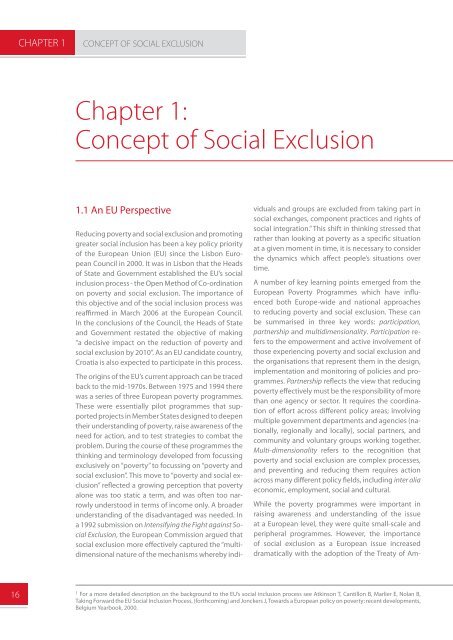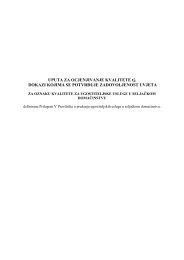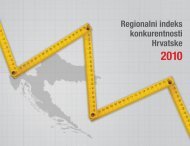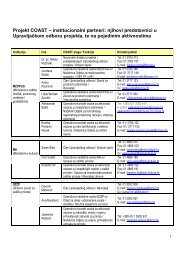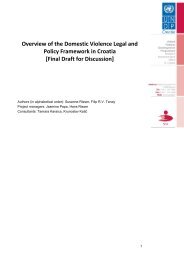WEB engleska verzija end.indd - UNDP Croatia
WEB engleska verzija end.indd - UNDP Croatia
WEB engleska verzija end.indd - UNDP Croatia
- No tags were found...
Create successful ePaper yourself
Turn your PDF publications into a flip-book with our unique Google optimized e-Paper software.
CHAPTER 1CONCEPT OF SOCIAL EXCLUSIONChapter 1:Concept of Social Exclusion1.1 An EU PerspectiveReducing poverty and social exclusion and promotinggreater social inclusion has been a key policy priorityof the European Union (EU) since the Lisbon EuropeanCouncil in 2000. It was in Lisbon that the Headsof State and Government established the EU’s socialinclusion process - the Open Method of Co-ordinationon poverty and social exclusion. The importance ofthis objective and of the social inclusion process wasreaffirmed in March 2006 at the European Council.In the conclusions of the Council, the Heads of Stateand Government restated the objective of making“a decisive impact on the reduction of poverty andsocial exclusion by 2010”. As an EU candidate country,<strong>Croatia</strong> is also expected to participate in this process.The origins of the EU’s current approach can be tracedback to the mid-1970s. Between 1975 and 1994 therewas a series of three European poverty programmes.These were essentially pilot programmes that supportedprojects in Member States designed to deepentheir understanding of poverty, raise awareness of theneed for action, and to test strategies to combat theproblem. During the course of these programmes thethinking and terminology developed from focussingexclusively on “poverty” to focussing on “poverty andsocial exclusion”. This move to “poverty and social exclusion”reflected a growing perception that povertyalone was too static a term, and was often too narrowlyunderstood in terms of income only. A broaderunderstanding of the disadvantaged was needed. Ina 1992 submission on Intensifying the Fight against SocialExclusion, the European Commission argued thatsocial exclusion more effectively captured the “multidimensionalnature of the mechanisms whereby individualsand groups are excluded from taking part insocial exchanges, component practices and rights ofsocial integration.” This shift in thinking stressed thatrather than looking at poverty as a specific situationat a given moment in time, it is necessary to considerthe dynamics which affect people’s situations overtime.A number of key learning points emerged from theEuropean Poverty Programmes which have influencedboth Europe-wide and national approachesto reducing poverty and social exclusion. These canbe summarised in three key words: participation,partnership and multidimensionality. Participation refersto the empowerment and active involvement ofthose experiencing poverty and social exclusion andthe organisations that represent them in the design,implementation and monitoring of policies and programmes.Partnership reflects the view that reducingpoverty effectively must be the responsibility of morethan one agency or sector. It requires the coordinationof effort across different policy areas; involvingmultiple government departments and agencies (nationally,regionally and locally), social partners, andcommunity and voluntary groups working together.Multi-dimensionality refers to the recognition thatpoverty and social exclusion are complex processes,and preventing and reducing them requires actionacross many different policy fields, including inter aliaeconomic, employment, social and cultural.While the poverty programmes were important inraising awareness and understanding of the issueat a European level, they were quite small-scale andperipheral programmes. However, the importanceof social exclusion as a European issue increaseddramatically with the adoption of the Treaty of Am-161 For a more detailed description on the background to the EU’s social inclusion process see Atkinson T, Cantillon B, Marlier E, Nolan B,Taking Forward the EU Social Inclusion Process, (forthcoming) and Jonckers J, Towards a European policy on poverty: recent developments,Belgium Yearbook, 2000.


